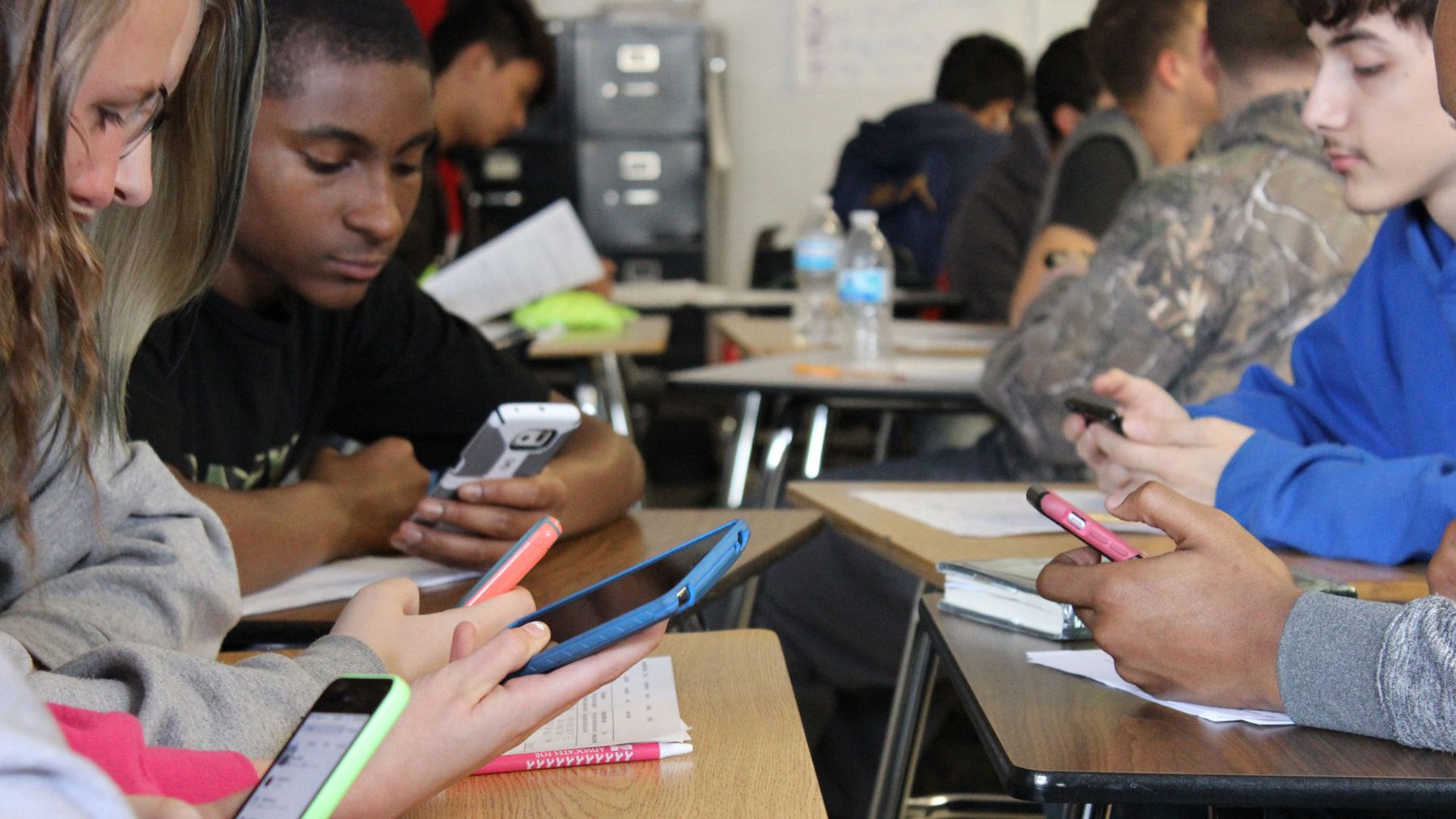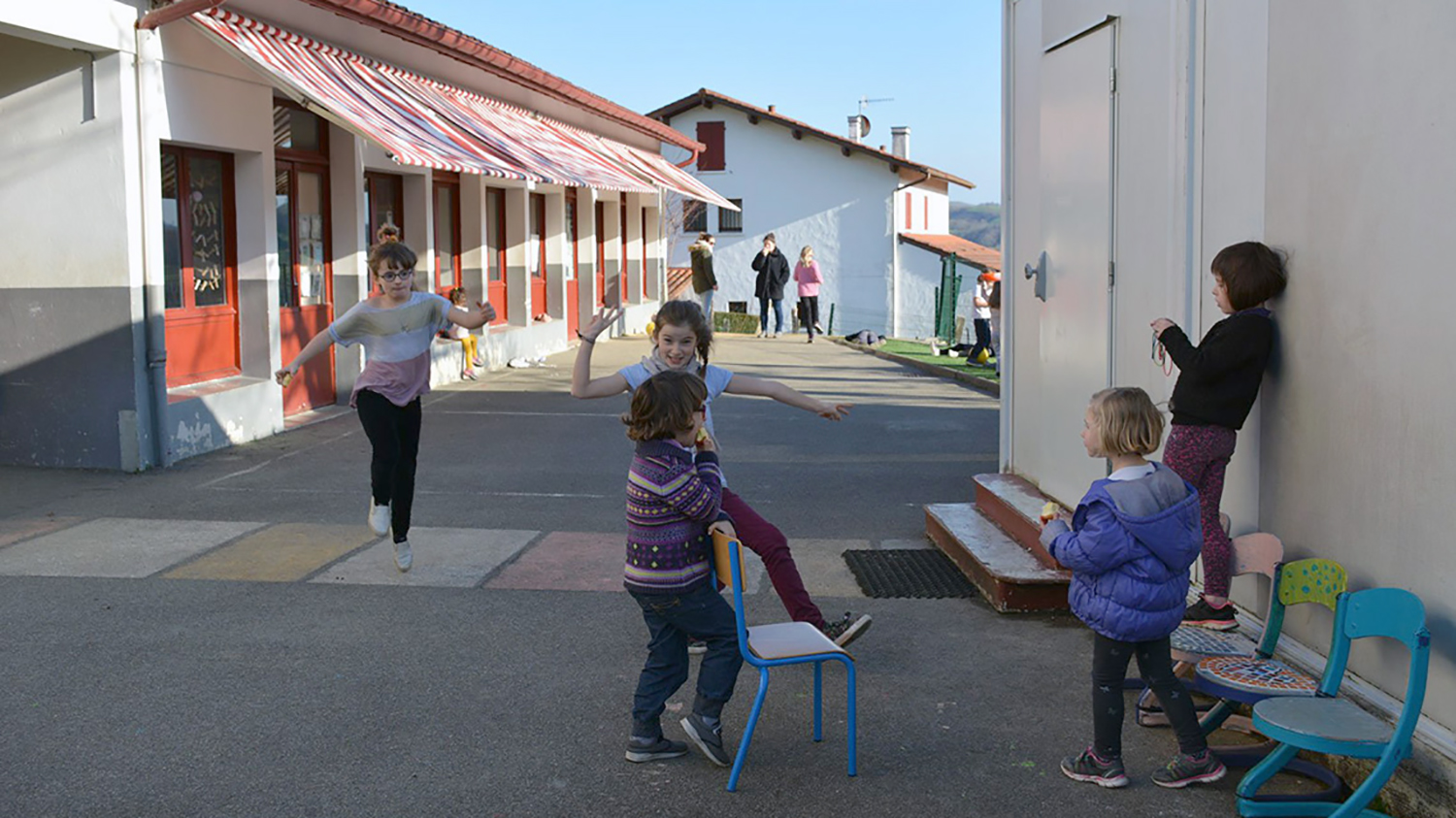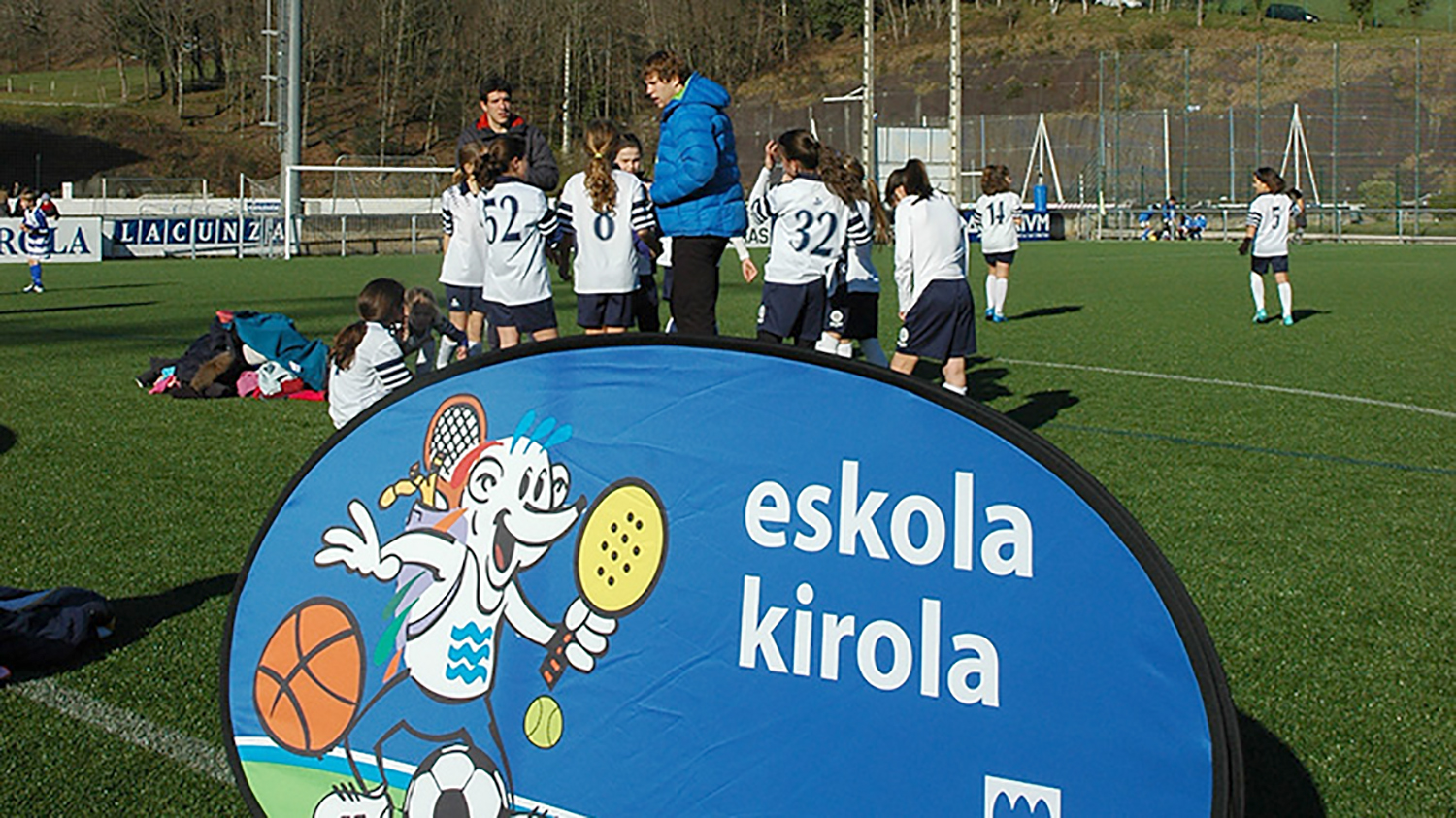What to Measure and How to Evaluate Students
- Selectivities in the South, Basses in the North, will determine the future of thousands of students who want to pursue a higher degree these days. These are massive studies that are carried out in a few days, leaving a limited margin for change and similar to the revaluations they carry out in many European countries. It is determined by the selection test in two directions: previously, the Baccalaureate studies are oriented to pass the exam; then, the selection for the career is made according to the criteria of the exam. Therefore, considering that the selection test mainly measures the contents, the competences hardly have a place in the Baccalaureate. However, the arrival of Bologna at the university sues other students who consider them. How to deal with this contradiction? We have the starting point of the round table. To complete it, Gillermo Etxebarria has written an article about the difficulties faced by the citizens of the North who want to do university in Basque, and Ramón Flecha has written about the selection criteria used by prestigious international universities.
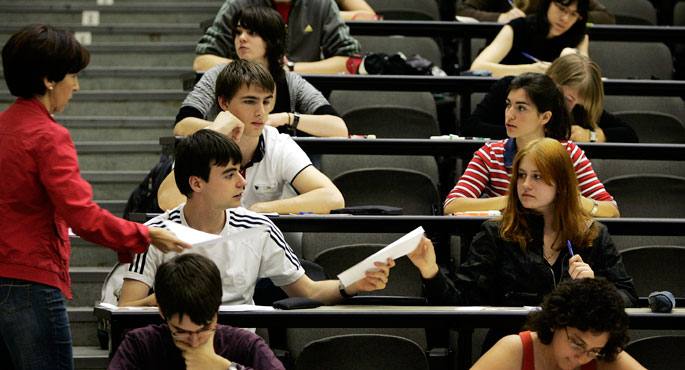
LARRUN Selectivity and Low, what kind of studies are they? What are their goals and what do they consider?
Assisted by Josu Agirre: These are very classic exercises in selectivity and the change in these last years-or has been shown by the university, as well as by the Department of Education, because today this test is organized between the two. But these changes are very complex, it is difficult to introduce changes in such a massive study. The last thing that is being proposed is the introduction of an oral exam in a foreign language by 2012. At first it seemed that the change could be interesting to start exploring new things, but the last thing we have heard is that it will be a very simple change, which will include only an exercise of listening comprehension and not anything verbal produced by oneself, due to the complexity of the study and the fact that it is so massive. How to do it with thousands of students?
According to J. I'm talking about F. According to Lukas: Two problems must be distinguished: the sociological problem and the technical problem. A sociological problem would be what this selective test is for, or what it is that you want to select. If it were to happen at the university that there is as much space for all students as you would like, this election would have only one goal: what is the ability to go to university? Over the years, we see that more than 90% pass the exam in the UAE, so this is not measured. What it says is the grade you have taken and the chances you have of going to learn one thing or another. Some careers become fashionable and students want to learn this, but from one year to the next it is not possible to introduce new teachers, create new faculties, and five years later expel all of them. How many architects or engineers or... do we need? How many graduates? There is also this question behind this sociological problem. And the other problems, the technical ones, are those commented by José: how do we carry out this test.
According to J. More places to stay in Aguirre: It is a test of selection for the university to organize which one will enter the different degrees. It also has the function of system approval. And I think I want to give more and more strength to this function. We recently received a brief from the schools stating that the Inspectorate will study in detail the schools that show a significant difference between the selective result and the results that are given in the school. In many European nations, there is no choice, but there is revaluation, and revaluation mainly has a counterpart function. The pressure is high: they demand very high averages to enter different grades, and in some schools there is a tendency to raise the average a little so that their students have better opportunities in this competition.
Maria Luisa Jaussi: The fact is that there is a 95% copy of those who pass the test, so the objective of the selection is not met. The selection is made by the Baccalaureate, but almost all those who pass the Baccalaureate pass the Selectivity, and this study has become a reward: those with high marks can choose the career they want, but it may not have anything to do with what they have learned previously. Selection is not made for high-level grades, selection is made on demand.
According to J.F. According to Lukas: Oh, yeah, yeah. For example, there was a time when the Magisterium Schools were without students and today one of the highest grades is demanded by the Magisterium because there is a great demand.
According to M.L. More places to stay in Jaussi: And they're also asking for a very high grade in Audiovisual because there's a lot of demand, but then a lot of Selectivity lessons have nothing to do with the contents of that career, so it's not a selection for that career, it's a career.
According to J.F. According to Lukas: In relation to the homologation, changes have been made in the percentage that is given to each of them to extract the average between the grade of the center and the grade of Selectivity: it was the first half and half, and it seems that the more progreen the government should give more importance to the qualification of Baccalaureate and less to Selectivity; and vice versa the government of the right. And judxtu is the other way around: because the pressure that has been mentioned before is true, but where can parents exert more pressure? In private and concerted schools, because there is something good about public schools for teaching staff: independence, they are not dependent on their parents in that sense. And it can be seen that the Selectivity lowers the average for students coming from the private sector more than for those coming from the public; I think that this homologation is also necessary.
According to J. More places to stay in Aguirre: The grade you have taken in the Baccalaureate to calculate your entrance to the university is 60% and the elective grade is 40%. And there is this concern, but no one has dared to take action, although in cases where it has been very evident (a difference of more than two points with respect to the Baccalaureate and Elective Note) the school has been called attention. Resolving this concern is not easy, however.
It is then a study for homologation. But should this be the test that will then decide who should go to college?
According to J. More places to stay in Aguirre: What has been measured so far is what the student knows; this is what the exam is designed for: what does the student know? And it seems that we should go another way: what is the student able to do? Be able to use this knowledge in different contexts. This should lead to a change of approach to the test. External tests (such as PISA) and evaluation diagnostics are also prepared from this new perspective. However, as I have already said, it is unlikely that fundamental changes will be introduced in such a large study. I do not see very clearly how this could be done, but I do see that the approach to evaluation should be changed.
It's about the M. I'm talking about L. More places to stay in Jaussi: I think it's proven that this test is not for the selection. And if it is for homologation, although in principle it was not its objective, other means must be considered. Such PISA and studies, for example, are more valuable for homologation in order to evaluate the system. And in order to allow students to enter the university according to the study they want to study, there are many other, more ideal paths. In Europe, similar examinations are carried out, but in many places other requirements are required in addition to the exam to enter the university. In Finland, for example, personal tests are carried out to enter the Teaching career, to take into account your ability to empathize, cultivate diversity... and other necessary things. Or in the U.S., there is no such general proof. It must be questioned whether it is necessary, if it is not necessary to establish other criteria to measure the competences corresponding to each study, such as the trajectory of the student until then in relation to these competences.
According to J.F. According to Lukas: But in the U.S., money is very limited. There you can go to one university or another depending on the scholarships you get or the money your parents have, because public universities are also very expensive, not like here. Regardless, some kind of system is needed to guide the students; is this exam the best? Well, probably not, we have to consider how tests like PISA are carried out, trying to evaluate competencies or competencies. Or rather, it is measured, because it is more measured than evaluated. After all, a number comes out. There are some things that have progressed because there are so called specific sections now and with them each student can then choose the lessons that will be useful for his or her career to get more scores on them. That's one way. The other way is the one that you, María Luisa, have commented: that each career puts on its specific exams or tests or demands its specific conditions; sometimes it will be content, sometimes it will be competences and sometimes it will be psychological characteristics. But we never got into that. Until now a person in college could have finished a bachelor’s degree if their content level was considered acceptable, but it has never been taken into account what that person is like; if he is a criminal, or racist... it has never been taken into account. Now, with Bologna, it is assumed that this must also be taken into account, that the university is not only an academic preparation, but a more integral one. At least it is said, if this is possible or not, then it is more complex.
According to M.L. More places to stay in Jaussi: The other day a friend told me that they have big problems in the Audiovisual career, because due to the high demand they require a high grade to enter, but the skills needed there are of another type. They want creative students, and that’s where many have a big gap, despite their ability to learn. On the other hand, one of the Finnish universities commented that there is a greater tendency of women to study Master's than men, and since they were demanding a higher grade, they could not achieve their intention: to attract more and more boys. To reverse this, the aforementioned measures (psychological, personal, etc.) were added to the criteria.
According to J. More places to stay in Aguirre: This, in any case, would lead us to the enormous complexity: are we saying that each faculty and grade must do its own entrance test?
According to M.L. More places to stay in Jaussi: Or that you have to define your criteria...
According to J. More places to stay in Aguirre: This debate preceded the latest legislative change on Selectivity: whether a single access test should be organized for all or for each faculty. I don’t find a huge advantage in everyone doing their own because we would drive the students crazy. How many entrance exams should a student take? For me it is appropriate to have something homologating to organize the entrance to the university. It is true that some changes are currently being made to access certain degrees, specific tests, different coefficients... For Physical Education, Architecture or Translation and Interpretation, for example, there are special tests to access these faculties. But test each grade...
According to M.L. More places to stay in Jaussi: I am not saying that a test should be done for each degree, what I am saying is that other conditions should be considered, the student should be valued according to other criteria.
And then what should there be between high school and college?
According to J. More places to stay in Aguirre: What is clear is that these types of tests have the value of measuring certain competences in some way: the competences most linked to the subjects of knowledge. And what are those? Four competencies: linguistic competence, mathematics, health and science, and art and history. What doesn’t measure at all? The four competences that are more transversal: learning to learn, citizenship and coexistence, entrepreneurship, and technological or ICT competence. Yes, it would take something to measure these transversal competitions in the university, because it could happen, as mentioned above, that a degree is taken out and that you are licensed without having any oral competition; go to a school to teach and you can’t teach!
According to M.L. More places to stay in Jaussi: That’s right, and the ones you’ve named are just basic skills, not to mention the skills that each career requires...
How does the Baccalaureate Selectivity Test determine?
According to M.L. More places to stay in Jaussi: From the outside (because I’m not a high school teacher), it seems to condition him completely, especially the second grade. Therefore, if the exam valued all the competences it would be fine, but since it only considers some, it greatly reduces what is taught in the Baccalaureate.
According to J. More places to stay in Aguirre: From experience, the Baccalaureate is a very short stage, two years, the first year is a relatively quiet course, there is not so much pressure, but the second level is almost all and almost all the knowledge (except the electives) is aimed at passing the test of choice in the best way. To do this, the entire course is dedicated to answering questions of the type that arise in the Selection Test. Can we change that? It will be very difficult, what we have to offer to the student and the family is the way to have the most appropriate access to the university, and that being so, we have to prepare them to pass the exam.
According to J.F. According to Lukas: If a test limits what will be done in the teaching-learning process, this test should be questioned. It happens with selectivity, and the evaluation diagnoses that are now being carried out in Primary and Compulsory Secondary Education can also present this risk. I mean, if a study is going to condition the process, we should be careful. And if these studies need to be maintained, a solution may be to improve these studies. The more and better competencies the exams measure, the richer the teaching-learning process will also be. In the study of history, let us consider, if we ask about years, people and events, that is, if we work only memory, in the teaching-learning process we will also work only memory. But if we put more complex problems into the study of history and want to understand why this or that happened in such a year, we will deal with such matters. With the current test, creativity is cultivated in some subjects (for example, to make a textual comment, because the text will always be new), but in other areas the questions are very repetitive, even in mathematics and sciences: when you ask a specific type of mathematical header, for example, I may not understand the header, but I know what steps I have to take to get the result. Mechanistic teaching makes no sense. The solution, as we have already said, can be to improve the analysis, more linked to the competences.
Is it possible to say that the study is ill-conceived?
According to J.F. According to Lukas: Saying it's wrong is a lot, but it should get better. The objective of this study was initially to see if schools prepared students to go to university; this is now overcome, the problem is that not everyone can study the desired career according to the grade, this selection must be made according to something, and the best way that has been thought for now is this study.
According to J. More places to stay in Aguirre: I would also say it needs to be improved. External tests can lead to a methodological change. We are seeing that the methodologies we use today are a bit outdated, that the student should be given more prominence, that he should guide his learning... and we should take advantage of these external tests to promote methodological change. To do this, the study model itself will have to be modified, including modifications. It’s the same with PISA, because it helps to realize that we may not be doing so well, so let’s make changes to the methodology.
According to M.L. More places to stay in Jaussi: The tests used in assessment diagnoses and PISA are not traditional tests and this is observed in schools. They begin to think that they need to change something, not only because of the results, but because new competencies are measured, and they have seen the need to cultivate them. If the schools are very traditional, they do not get good results in these tests.
According to J.F. According to Lukas: Speaking of PISA and assessment diagnostics, which of the eight to nine competencies addressed in FP and ESO are considered by PISA and assessment diagnostics? In both cases, they almost repeat themselves: language always, mathematics always, and the rest, whether it fits or never. And there are other skills that are as important or more important than language and mathematics. Finland achieves very good results in PISA, but perhaps in other areas, which are not taken into account in PISA, they are not so good.
According to M.L. More places to stay in Jaussi: For example, what?
According to J.F. According to Lukas: For example, several students commit suicide...
According to M.L. More places to stay in Jaussi: Things happen in other places, nothing to do with it.
According to J.F. According to Lukas: What I want to say is that there are more things to consider and, for example, it is impossible for us to want to get the results that Finland gets from PISA. I don’t know how many years it will take, but it won’t be for two years.
According to M.L. More places to stay in Jaussi: Because they have another teaching model.
According to J.F. According to Lukas: And another social model.
According to M.L. More places to stay in Jaussi: If we changed the teaching model, we would change a lot of things.
According to J.F. According to Lukas: But we wouldn’t get to their results for many years. The socio-economic-cultural level of the parents is an important variant to explain the student’s performance and if you take the parents of ESO students from Finland, they have a high percentage of secondary studies, while here the percentage is much lower.
According to M.L. More places to stay in Jaussi: There is another factor to consider: there, from the first moment, the parent is involved in the design of the curriculum, evaluating the dynamics that exist in the studies, etc. It has been observed that this participation is an important step for students to achieve good results, in addition to the cultural level of their parents. Even if the parents do not have a high level, when they participate they get much better results, which is systematically organised in Finland, not like here.
Should selectivity be more directed towards the PISA type model?
According to J.F. According to Lukas: Depending on what you want to measure, yes. In selectivity, some studies are still closely related to content, and PISA is more related to competencies.
According to M.L. More places to stay in Jaussi: Yes, and it's important to measure skills.
According to J. More places to stay in Aguirre: In order to measure these transversal skills mentioned above, we should do something, tend to propose more extensive exercises.
And these changes, the improvements that you have mentioned, who is responsible for them? What is behind all this and is there any intention to change it?
According to J. More places to stay in Aguirre: Until recently, it was the responsibility of the university; today there is a division of responsibility between the university and the Department of Education. I believe that both should encourage a change in the study model, but always in collaboration with schools. This collaboration is very important and it is true that the UPV has a lot of contact with schools because it has to be that way. And yet, in recent years, there has always been something wrong, something agreed upon and then something asked or something like that.
According to M.L. More places to stay in Jaussi: The problem that arises is that there is no model to measure competences. When it was proposed to carry out the citizenship test, for example, it was very difficult for them to obtain approved and experienced models. I have doubts as to whether the test that has been created actually measures citizenship, but I suppose they will also have that doubt. You always measure the same things because you have that experience...
According to J.F. According to Lukas: Yeah, it's also doubtful if some competitions can be measured, isn't it?
According to M.L. More places to stay in Jaussi: Yes, also in a massive way...
According to J.F. According to Lukas: In any case, even if the exams change, and let’s assume that we do much better exams, related to and complemented by competences, the sociological problem mentioned in the first point will always exist: some will stop without making the career they want to do. What we need to achieve is that this study is as fair as possible, but fair in terms of what? According to the skills that the student has acquired? Well, let's do that, but not everyone will be satisfied because this evaluation is not to make people happy, but to make them choose.
According to M.L. More places to stay in Jaussi: In the pursuit of justice, it is mainly the measurement of academic content in Selectivity and this is cultivated in some socio-economic and cultural environments since the birth of the child, but in other environments it is not. Therefore, it is difficult for students from other areas to reach high school, and even those who do, it is difficult to obtain high marks. The system creates differences from the moment it measures academic content. In addition to questioning whether content is the most appropriate criterion for pursuing one career or another, it is also necessary to question whether it is fair to have such a measure.
From what I hear, what is clear is that the evaluation determines a lot the learning process itself, it adapts to the type of exam that is taught.
According to J.F. According to Lukas: It has happened so far in the university: when the teacher explains on the first day what the evaluation of this lesson will be like, the students adapt to it and work the lesson accordingly. Now with Bologna it is assumed that the study can have its relevance, but that there will be another type of evaluation and therefore another type of teaching-learning processes will be created. In any case, we can change something in the case of Selectivity, but other things I don’t think can be changed.
According to J. More places to stay in Aguirre: With a single test, it must be a test for results. In a couple of days, the results you have achieved in different exercises. That's it. That's it. The concept of evaluation is much broader than that. We use evaluation in schools to make adjustments, to measure the process itself (whether we are doing well or not, if we need to change something)... No, the choice test is a final exercise, something that will measure results as access to the university: there is no other way to influence it, but what we can do is to design that test well and think more broadly in relation to what we have today.
What kind of students does the university want? What is a “good student”?
According to J. More places to stay in Aguirre: Until two years ago, he had the best record. That was the student the university wanted. Since then, with the new selection test, they have introduced a small contention to this: those with the best record, but in specific areas of knowledge. This is the purpose of the specific tests: In the medical grade they will look at the fact that the student has a good record, but above all that it is good in Chemistry and Biology. It's an interesting and fairly fair assumption.
What does the business world want? It doesn’t require anyone with a huge specialization, but with a degree, with good basic skills, and more and more, who is a good person, able to work in a team, in relationships... This is what the environment demands and we have detected this, but how is this measured?
According to J.F. According to Lukas: There are two aspects there. On the one hand, there is a need for certain minority competences related to the contents: the ability to read and write, mathematics in certain careers, language... But then there is a second section. Is it enough to have minority competences in these areas of knowledge? No, because at the university you will work as a team, which is something that is cultivated as a child, in FP... but in ESO and Bachillerato less and less, and when they come to the university the students still have that to learn. It is something that you need to know in companies and anywhere, it is impossible to think that you will only work after finishing a degree, you will always work with others. In addition, you must be an integral person, a citizen; the doctor is not only a person able to perform operations, but also an empathy is necessary and these things are becoming more and more important. There are also cross-cutting issues that are important in the university: having the ability to speak in public, among others.
According to J. More places to stay in Aguirre: After all, the way in which the evaluation is proposed has a huge impact on the methodology. To give you an example: Do you practice orality in high school? Sometimes, yes, but not because the election requires us to do so, but because the EGA exam has to be prepared. Therefore, evaluations can lead to important changes in methodologies, but for this we must consider evaluations in the most appropriate way.
According to M.L. More places to stay in Jaussi: Yes, and it has been mentioned that the test of choice measures whether they know how to write and read well, but everyone in the Baccalaureate has this certified and also in the career that requires the highest grade perhaps this is not the most necessary because the high grade does not depend on skills, but on demand. The university is losing students who can have a high capacity in some areas but have not been able to pass the Baccalaureate, because the weight of the contents in the Baccalaureate is determined by the Selectivity. We're losing all these students in our system.
According to J. More places to stay in Aguirre: I have another perception. Currently, in our valley, for example, 85-90% of the students in ESO 4 complete the Baccalaureate. And their survival rate is very high, around 91%. Otherwise, in two or three years almost all students pass it, and once you have a Bachelor’s degree, passing the exam is very easy. It is more difficult to pass the Baccalaureate than to pass the elective test. Last year, 97% of those who showed up in Gipuzkoa passed the selection test. The entrance to the university is therefore almost universal at the moment. Another thing is whether you will do the degree you want or not.
According to M.L. More places to stay in Jaussi: But it's not like that everywhere...
According to J. More places to stay in Aguirre: Without a ESO qualification, 12-14% remain in the UAE, around 30% in Spain.
According to M.L. More places to stay in Jaussi: The fact that 15% is excluded is a lot for me, because in that 15% they are always the same, there are socio-economic and cultural factors in there.
According to J.F. According to Lukas: Yes, I said before, among other things, socio-economic and cultural factors make a difference between Finland and us.
According to M.L. More places to stay in Jaussi: The way our system is organized, socio-economic and cultural factors are important, but if we change the model, we will overcome these differences.
According to J. More places to stay in Aguirre: I find it hard to turn that around. The socio-economic impact is very important and in recent years there has been an increase in the number of people coming from abroad. These form the core of those who are currently left without a degree.
According to M.L. More places to stay in Jaussi: This is not so in itself, but the effect within the system. We can discuss the improvement of evaluation, the introduction of more competition, etc., but for me it is very important to make external evaluations to the schools themselves, to see which schools’ approaches are the most successful and to repeat these models, because several schools with a low socio-economic level are overcoming this condition and are achieving good results. It would be interesting for some schools to learn from each other, but unfortunately the result of these studies is confidential.
According to J. More places to stay in Aguirre: I agree with you. Speaking of evaluation in general, on the one hand we have the studies carried out at a certain moment (screening, PISA, evaluation diagnoses...) and these provide certain information, a small snapshot of a moment is made. But if we want to change and give students better opportunities, we need to measure processes, not just results. And this is mainly related to the internal evaluation, the internal evaluation of the centers, to evaluate the main elements that are provided in the teaching-learning process. I also think it is extremely important to talk about teacher assessment or at least self-assessment. We have agreed on a concept: the teaching-learning process. In this process there are two participatory elements: the most important is the agent that performs the learning, the student, but the docent-teacher is also an important element. In the most successful systems, such as Finland, the best and most prepared end up as teachers. In our country, we are constantly evaluating students, and nobody is responsible for the evaluation of the teacher and the school. In this process there is a mirror effect: what the student learns is influenced by many factors, the socio-economic factor is important, but the school also has a lot to say, docentes, school systems, influences, contours, motivations... And on the other side of the mirror is the role of the teaching-docent-teacher, of the school, this is not evaluated, and it will hardly give a great improvement in the teaching-learning process if the two elements are not well measured. We have now started to implement self-assessment systems in schools, but in a very simple way.
According to M.L. More places to stay in Jaussi: As you said, the diagnostic evaluation is done in one day and it is a photograph, but this can also be contrasted with the results of the school and there has usually not been much imbalance in the results so far. In the schools that I know, the result of this photo is quite similar to that of the school. Processes are important, but they cannot be separated from results: processes will never be good, if the results are bad; they are related. I believe that the process has been greatly emphasized, forgetting the results, and the most important thing for me is the result, that is what we are for and that all the students have to learn.
And you have highlighted the importance of students and teachers, Josu, I would also add the involvement of the environment and families. In Finland they take all this into account and what I have seen so far is that schools and systems that achieve balance, equality and efficiency also take this third factor into account.
According to J.F. According to Lukas: Different evaluations with different objectives have been mentioned. If we talk about the evaluation diagnosis, it is true that it gives a specific photo or result, but in theory at least the intention is to take this photo every year and have the opportunity to see the evolution. With the result of a classroom in a school in one year, it is not possible to draw much conclusions, but if we observe in several years that in a competition poor results are repeated, this means that we are not doing something well, at least according to the competencies that the evaluation diagnosis measures. And the intention of the evaluation diagnosis is an evaluation for improvement, because with this diagnosis it is assumed that later the school must carry out its internal evaluation in order to improve. I have my doubts about whether this internal evaluation is being carried out, and even if it is being carried out, some aspects are easier to evaluate, but others (such as evaluating teachers) are more complex.
The purpose of the first evaluation was to provide feedback or feedback information, but today we talk about forward or forward feedback. We evaluate (whether it is schools or students) to move forward; we will use this information to improve our situation. Aside from Selectivity, however, because that is not their intention.
On the other hand, in the studies carried out in the 1960s by Coleman and others, it was clear that the socio-economic-cultural level of the parents determines the performance of the student. This was a great disgrace in the beginning, “if we take bad students, ours has done it”, but then they realized, as you say, Maria Luisa, that students of the same socio-economic-cultural level obtained different results in one or another school. There is a school effect. What happens inside the school? Sometimes it looks like a black box; what happens in school that can influence the improvement of the results? I would say that the methodology has something to do with it and you have mentioned a lot of other factors. I would add a couple: on the one hand, the management team is important for the proper functioning of the school, and on the other hand, expectations or expectations. If we think that our students cannot progress much, they will not, and if we think that they have the opportunity to improve, they will improve.
Agirre mentions that we constantly evaluate students. Where should the balance between process and evaluation be located?
According to J.F. According to Lukas: Previously, in the university, even at previous levels, the most important was the teacher; the teacher taught and from there the students were measured or evaluated according to the work done and the result obtained. This result was the problem of the student, not of the teacher, but now this is changing: what matters is not what the teacher teaches, but what the student learns. He is the important one, and to learn it is not enough to take notes from the teacher, he has to do the work. The teacher loses power, has to act as a mentor or guide, and constantly inspects the work that the students do, the process. Because it is assumed that if the process improves, the result will be better.
According to M.L. Take a look at the following: In relation to what you have said, the conclusion that has remained with Coleman and other subsequent studies is that the results depend on the socio-economic level and if bad results are obtained by proposing good processes, it is the problem of the student, not of the school, no expectation is placed. Then you have seen what you said, which is not so, but I think that we still have the influence of the other idea, and if we forget the results, the processes will not be good. And it has also been observed that it is more important than the formation of parents to involve them in the formation, because it is very effective in the results.
According to J. More places to stay in Aguirre: We are at an age when we have a large part of the teaching in our educational system, more than 40 years old, all of them included in a unified way, and our teaching method has been very traditional because we have only known it. We have a huge problem with training and theoretically we may know how knowledge is created, that one has to create it, the students, but then we have difficulties to put it into practice, we are not in formats, and there we have a great challenge. They are promoting cooperative learning and concepts like this, but we have a hard time changing them. However, there will be a tremendous generational change in education over the next ten years, most teachers will change, and we must seize the moment to change the approach.
According to M.L. Take a look at the following: It is true that teachers find it difficult to adapt to changes, and we see it every day in the Teaching-Community project, in group dynamics. We organize groups and put a person (a university student, a parent...) to lead the group dynamics; when the role of the facilitator is performed by the teacher, they usually admit that it is very difficult for them to assume this role, not to teach.
How has Bologna influenced and will it influence the evaluation system?
According to J.F. According to Lukas: I don’t know how it will affect pre-university evaluations, but it is clear that it will affect the university if a real change is made, not only in the regulations. The students will work in a different way, they will no longer be master classes, but projects, teamwork... And if this is the case, it is assumed that the students that the university will demand must also be like this, active. Today, students still sit in the back row in college and aren’t used to doing dynamics. Not even to self-assessment, and self-assessment is very important, not only in the university, but from Primary, in the case of both students and teachers, because if I am not able to know where I am, what I know and where I have to go...
According to J. More places to stay in Aguirre: I believe that we must be optimistic and that we are on the right track with the measures that Bologna and the education system as a whole are taking. We need time and start to transform things in schools, but if there is a desire, we do not know very well how to make the change, but if there is a desire. It is already being heard in high school that, instead of the teacher taking the lead, this must be distributed so that the student can take it, individually and in a group. But we are beginners, Bologna, PISA... it is a matter of five years, we must take it with patience. For example, the last curriculum released by the Department of Education has been the most elective in Baccalaureate to work on projects. It was intended to acquire something interesting that existed in Catalonia, the final project of the Baccalaureate, a project that brings together the skills acquired from all the subjects of knowledge. Another thing is when we will get to work in the classroom with this curricular approach, but we will get there.
To conclude, although you have already mentioned other foreign models, in this leap from Baccalaureate to university, what criteria do they take into account internationally?
According to J. More places to stay in Aguirre: What I know is what is done in Europe: In Italy, France, Germany, the United Kingdom, they make a similar revaluation. And the objective is very clear: it is the means of homologation of the system, which, once it has been approved, directs the best results to the university or higher professional training. The impression is, moreover, that society sees it quite well, that it does not believe that this should change. What’s more, the impression of many is that the way this revaluation should be evaluated must be quite classic, academic: the one that gives the best results forward and that’s it. In France, for example, there has been a debate about whether or not the revaluation should be changed, and it has finally been decided that it is not a very fair path, because it is not compulsory education; and compulsory education must respond to everyone, but then the best ones must move forward.
According to J.F. According to Lukas: Here we have a mixed system in some way. There is no revaluation, but there is a system that takes into account the Selectivity and the work done in the previous two years. What scares me about Bologna is that, although I agree on the methodology, if it then brings from behind the privatization of the university or the reduction of the places... it is very dangerous. This type of system facilitates this: There's 1,000 places, and if you're the 1,001-year-old, you're not going to college. At the moment everyone here has access to the university after passing the Selectivity (and the Selectivity exceeds 95%), and I am afraid of what can happen with Bologna. However, some even say the opposite: why so many places in the university, if then society can’t take them all for work? The fact is that they are two different things because the university gives you training, not just a career path. If that were the case, some careers would have to disappear.
According to M.L. More places to stay in Jaussi: As I have already mentioned, on the one hand it is good to do a test to standardize all the schools, but on the other hand the system loses students who have not obtained enough grades and have other skills. There are other ways to prevent this from happening.
According to J. More places to stay in Aguirre: Lukas, I would like to add to what you have said that the delimitation of places - and it scares us all, yes, but it is also a reflection that our society must reflect on whether it is sustainable to have, I do not know how many universities and faculties, to make the degree that each student wants. Probably not, and that will have to be regulated. Another related issue: three years ago, the most successful companies in our valley, including CAF, had problems hiring professionals. With all this we will have to reflect to organize the studies, otherwise I do not know where we are going. And a third element: as professionals we are very concerned that certain degrees (for example, degrees that were the classical sciences of yesteryear: mathematics, physics, chemistry...) are hardly made by anyone; what will happen to us ten years from now, that as in Holland we will not have professionals for these specialties?
According to J.F. According to Lukas: What happens in these specialties is that the level of demand is very high in the first level and if they are not academically high
XX. mendearen bigarren zatian jaio zen Selektibitatea, aurretik zegoen errebalida ordezkatuz, eta unibertsitaterako sarrera ordenatzea du helburu. Azterketara aurkezteko beharrezkoa da Batxiler titulua izatea eta Espainiako unibertsitate ikasketak egin ahal izateko proba gainditu behar da. Zehazki, batez bestekoa kalkulatzeko ikaslearen Batxilergoko espedienteak %60 balio du eta Selektibitateko notak, %40.
Bere historian hainbat aldaketa izan ditu probak. Iaztik, adibidez, bi zatitan banatzen da: fase orokorrean, ikasle guztiek ematen dituzten lau ikasgaiak eta bakoitzak egin duen Batxilergo motaren araberako bosgarren bat gainditu behar dituzte. Fase espezifikoa deiturikoa borondatezkoa da, ikasleak unibertsitatean egin nahi dituen ikasketekin du zerikusia eta nota igotzeko balio du. Halaber, ikaslea deialdi batean baino gehiagotan aurkeztu ahal izango da fase orokorreko kalifikazioa edo fase espezifikoko gairen batekoa hobetzeko. Azken deialdian lortutako nota hartuko da kontuan, aurrekoa baino hobea bada.
Datutan:
Ikasgaiak: Gai orokorrak (Alemana; Euskara eta literatura; Filosofiaren historia; Frantsesa; Gaztelania eta literatura; Historia; Ingelesa; Italiera). Modalitateko gaiak (Analisi musikala II; Artearen historia; Biologia; Diseinua; Elektroteknia; Enpresaren ekonomia; Fisika; Geografia; Grekoa II; Gizarte zientziei aplikaturiko matematika II; Ikus-entzunezko kultura; Industria-Teknologia II; Kimika; Latina II; Literatura unibertsala; Lurraren eta ingurumenaren zientziak; Marrazketa artistikoa II; Marrazketa teknikoa II; Matematika II; Musikaren eta dantzaren historia).
Noiz: Ekainaren 8, 9 eta 10 (ezohiko deialdia, uztailaren 6, 7 eta 8an).
Zenbat: Iaz, Hego Euskal Herrian 10.266 lagun aurkeztu ziren ohiko deialdian.
Gainditua: Iaz, Hego Euskal Herrian %96,9ak gainditu zuen proba ohiko deialdian.
1808an sortu zen Baxoa eta Europako azterketa zaharrenetakoa da. Napoleon Bonapartek bultzatuta jaio zen, Frantzian ezagutza eta kultura zabaltzeko asmoz, eta Frantziako Iraultzaren balioak aintzat hartuz sortu zen: eskola errepublikanoa, laikoa, publikoa eta derrigorrezkoa. Batxilergoa amaitzerakoan, lortutako ikasketa maila egiaztatzen duen proba da Baxoa, eginiko ikasketei balio ofiziala ematen diena, eta hortaz, unibertsitatera joan ahal izateko Baccalauréat diploma lortzea beharrezkoa dute Frantziako Estatuko ikasleek. Selektibitatetik ezberdintzen duen gauzetako bat da Frantziako Estatuan Baxoko azken nota baino ez dela hartzen kontuan; Espainiako Estatuan aldiz, Batxilergoko notaren eta Selektibitatekoaren arteko batez bestekoa egiten da.
Baxoko azterketak bi etapatan egin ohi dira: lizeoko bigarren urte amaieran zenbait ikasgai egiten dituzte, eta gainerakoak Terminala bukatzean. Hiru Baxo mota daude, lizeoan jarraitutako hiru bideen araberakoak: Baxo orokorra, teknologikoa eta profesionala.
20ko eskalan puntuatzen da azterketa eta 8 baino gutxiago ateratzen duenak hurrengo urtean errepikatu beharko du proba. 8-10 arteko nota lortzen duenak errepexarako aukera dauka: idatziz gainditu dituen bi gai hautatu eta ahoz egin.
Datutan:
Ikasgaiak: Baxo orokorraren baitan daude Ekonomiko eta soziala, Literarioa, eta Zientifikoa; teknologikoaren baitan, Kudeaketaren zientziak eta teknologiak, Zientzia eta teknologia industrialak, Laborategiko zientzia eta teknologiak, Osasun eta gizarte zientzia eta teknologiak, Bizitza eta agronomiaren zientzia eta teknologiak, Musika eta dantzaren teknikak, eta Ostalaritza; eta Baxo profesionalaren baitan, 80 espezialitate inguru daude (Aeronautika, Okina, Karrozeria, Modaren lanbideak, Argazkilaritza, Idazkaritza…)
Noiz: Ekainak 16, 17, 20, 21, 22.
Zenbat: Iaz, Pirinio Atlantikoen departamenduan, 3.305 lagun aurkeztu ziren Baxo orokorrera, 1.519 teknologikora, eta 1.108 profesionalera.
Gainditua: Iaz, gure departamenduan %91,4ak gainditu zuen orokorra, %87,9ak teknologikoa eta %90,4ak profesionala.
J. F. LUKAS.
EHUko irakaslea
Orion (Gipuzkoa) jaioa, 1963an. Pedagogian doktorea, Filosofia eta Hezkuntza Zientzietan lizentziatua eta Maisu-Maistra ikasketetan diplomatua, aditua da hezkuntzaren neurketan eta ebaluazioan. Egun, irakasle titularra da EHUko Filosofia eta Hezkuntza Zientzien fakultatean, eta Eusko Jaurlaritzako Hezkuntza Sailaren Irakas-Sistema Ebaluatu eta Ikertzeko Erakundearen (ISEI-IVEI) Batzorde Zientifikoko kidea da. Ikerketa ugaritan hartu du parte, hainbat aldizkaritan publikatu du eta hezkuntzarekin (gehienetan hezkuntza sistemaren ebaluazioarekin) lotutako liburuak idatzi ditu, bakarka eta beste batzuekin.
JOSU AGIRRE
Beasain BHIko zuzendaria
Ataunen (Gipuzkoa) jaioa, 1956an. Filosofia eta Letratan lizentziaduna da, eta Hezkuntza Guneen Antolakuntzan, Zuzendaritzan eta Kudeaketan diplomatua. 32 urte daramatza irakaskuntza munduan eta Bigarren Hezkuntzako katedraduna da Euskara eta Literaturan. BiHeren (Bigarren Hezkuntzako Zuzendarien Elkartea) eta FEDADIren (Federación Estatal de Asociaciones de Directivos de IES) sortzailea, Kalitatea hezkuntzan eta ikastetxearen autonomia proiektuan hartu du parte. Hainbat aldizkaritan eta kongresutan hartu du parte. Beasain BHIko zuzendaria da egun.
MARIA LUISA JAUSSI
Ikas-komunitateko koordinatzailea
Portugaleten (Bizkaia) jaioa, 1960an. Psikologo eta pedagogo titulazioak ditu. CEI-IDCn gizarteratze programan hamar urte inguru egin ditu eta ISEI-IVEIn urte pare bat. Egun, Txurdinagako Berritzegunean Hezkuntza Premia Bereziko aholkularia da gizarteratze programan eta EAE mailan Ikas-komunitate proiektuko koordinatzaile lanak egiten ditu. Horrez gain, Adarra Pedagogia Berritzeko Mugimenduko partaide ere bada.
The Department of Education doesn't understand why public employees have gone on strike. He's got to ask the LAB Syndicate. This union signed an agreement with the department in April 2023. Two years later they have also called for a strike because, unlike the previous ones, the... [+]
Erretiratu berri den lankide-ohi baten omenez, Historiako irakaslea. Bejondeizula!
Hezkuntza-legeek azpimarratzen dute zein garrantzitsua den ikasleengan pentsamendu kritikoa sustatzea. Baina irakasle-klaustroak, garai batean ideien eztabaidarako eta proposamenak... [+]
I received your e-mail in personal mail on the strike portals. At first, like many others, I thought it was to let you know what options we have in the face of the strike. But no, the e-mail received was a political and communicative movement against the strike.
I will confess... [+]
And for another year, the unions have organized prefabricated strikes for us. And we, individually, will decide whether or not to join the strike, without the need for any assembly at the school.
The strike model that I was taught is no longer in vogue, it seems. In my... [+]







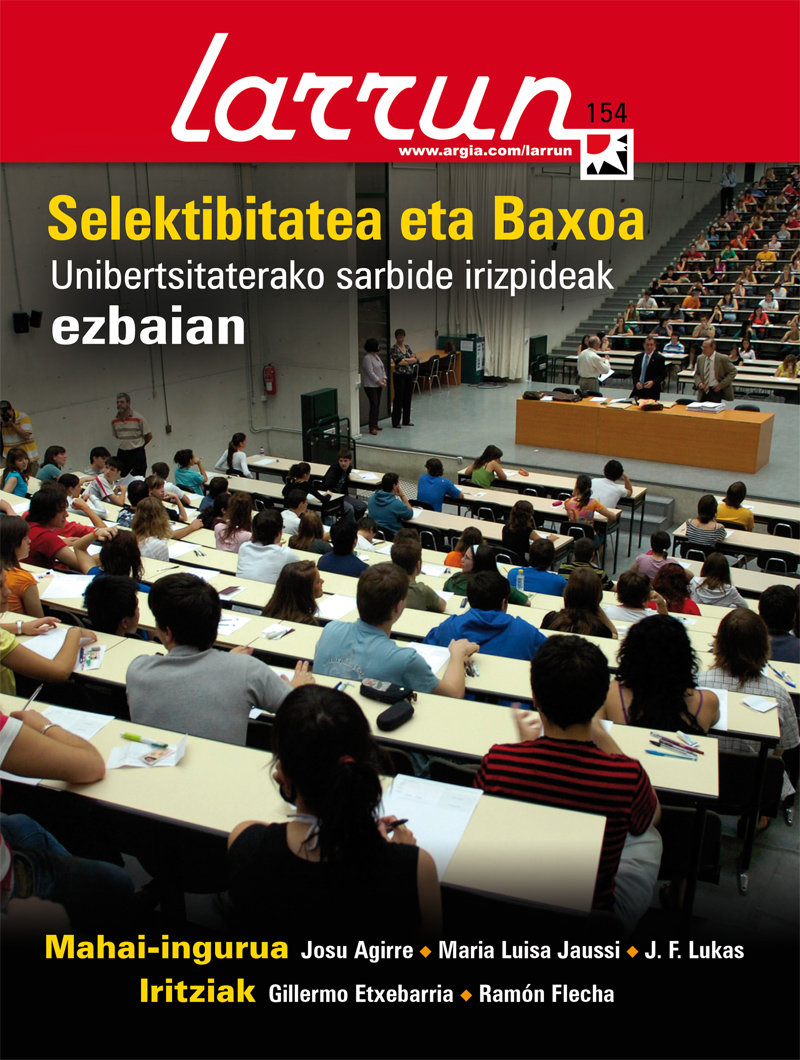





.jpg)

